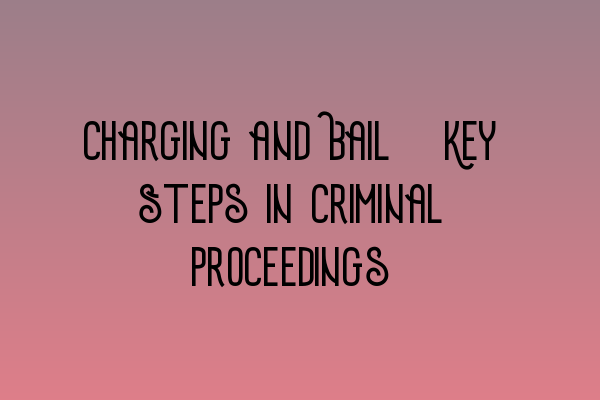Charging and Bail: Key Steps in Criminal Proceedings
Welcome to the SQE Criminal Law & Practice Law UK blog! Today, we will delve into the important steps of charging and bail in criminal proceedings. Understanding these key steps is crucial for aspiring solicitors and legal professionals alike. So, let’s get started!
1. Charging
The first step in a criminal case is the charging process. This involves formally accusing an individual of committing a crime. Once sufficient evidence has been gathered, the prosecutor will draft a charging document known as an indictment or a complaint. This document outlines the specific charges against the accused.
During the charging process, it is essential to consider the elements of the offense, the applicable law, and the evidence gathered. As a solicitor, you play a vital role in ensuring that the charges are appropriate and supported by the evidence.
For more information on SQE 1 Practice Exam Questions, check out our SQE 1 Practice Exam Questions article.
2. Bail
After being charged with a criminal offense, the accused may be released from custody pending trial. This is known as bail. Bail is a crucial component of the criminal justice system as it balances the rights of the accused with the need for public safety.
There are several factors that influence whether an individual should be granted bail, such as the severity of the crime, the defendant’s criminal history, and their flight risk. As a solicitor, it is your responsibility to advocate for your client’s right to bail if appropriate.
Interested in SQE 1 Practice Mocks? Take a look at our comprehensive SQE 1 Practice Mocks FLK1 FLK2 article.
Types of Bail
There are different types of bail that can be granted to an accused individual:
- Police Bail: This is granted by the police and allows the accused to remain at liberty until the court hearing.
- Court Bail: This is granted by a court and typically involves conditions that the accused must adhere to, such as reporting to a police station regularly or surrendering their passport.
- Surety Bail: This involves a third party providing financial assurance that the accused will appear in court.
Learn more about SQE 2 Preparation Courses by visiting our dedicated page on SQE 2 Preparation Courses.
Bail Hearings
When determining whether to grant bail, a court will conduct a bail hearing. During this hearing, the court assesses the following factors:
- Severity of the crime
- Strength of the evidence against the accused
- Defendant’s ties to the community
- Past criminal record
- Flight risk
As a solicitor, it is crucial to present a compelling argument to the court in favor of bail, highlighting the defendant’s ties to the community and their low flight risk.
SRA SQE Exam Dates
For information on the SRA SQE Exam Dates, be sure to check out our dedicated article on SRA SQE Exam Dates.
Charging and bail are critical stages in criminal proceedings. As a solicitor, it is your duty to navigate these steps carefully, ensuring the rights of your clients are protected. By understanding the charging process and advocating for bail when appropriate, you can provide the best legal representation.
Thank you for reading our blog post! We hope you found this information valuable. For more legal insights and preparatory resources, explore our SQE 1 Preparation Courses. Feel free to reach out to our team if you have any questions or require further assistance. Good luck in your legal career!
